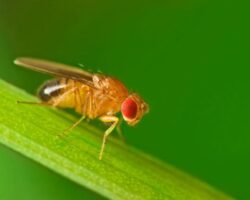Scientists discover the genetic switch that causes fruit flies to have “virgin births”

Researchers said on Friday they have hereditarily designed female natural product flies that can have posterity without requiring a male, denoting the initial time ‘virgin birth” has been prompted in a creature.
The posterity of the flies were likewise ready to conceive an offspring without mating, demonstrating the way that the quality could be passed down ages, in one more originally uncovered in a concentrate in the diary Current Science.
In the animal kingdom, virgin birth, also known as parthenogenesis, is uncommon but not unheard of.
The females of some egg-laying creatures – like reptiles and birds – are fit for conceiving an offspring without mating, typically further down the road when no guys are free.
Researchers uncovered last month that a female crocodile in a Costa Rican zoo who had never been close to a male laid an egg containing a full grown baby, the primary recorded virgin birth for the reptile.
Usually, a male’s sperm fertilize a female’s egg during sexual reproduction. In contrast, in parthenogenesis, the female produces the embryo on her own.
Alexis Sperling, a specialist at the UK’s Cambridge College and lead creator of the new review, advised AFP that she had needed to concentrate on virgin births since her pet imploring mantis had one.
Sperling and a number of other US researchers decided to conduct experiments on the fruit fly Drosophila melanogaster in an effort to identify a genetic cause for the phenomenon.
One of the most studied animals for genetic research is the fly, which normally reproduces sexually. Because of this, they could benefit from more than a century’s worth of knowledge.
‘Final desperate attempt’
To begin with, the group sequenced the genomes of two kinds of another organic product fly, Drosophila mercatorum. While the other strain requires a male for reproduction, one strain reproduces solely through virgin birth.
The researchers then compared the outcomes with the intention of identifying the genes that cause virgin births.
After that, they changed the genes of Drosophila melanogaster in a way that was similar to what they had seen in its close relative.
According to Sperling, the end product consisted of “fully parthenogenetic flies, which was much to my delight.”
Over 220,000 fruit flies were involved in the six-year study.
On the off chance that the hereditarily designed flies approached guys, they would imitate as ordinary.
However, of those who were kept apart, 1% to 2% reportedly gave up on ever seeing a man around the halfway point of their lives—roughly 40 days—and gave birth alone.
As is the case with all virgin births, their offspring, all of whom were female, had roughly the same number of children.
Due to the abundance of data on fruit flies and the difficulty of studying parthenogenesis, Sperling stated that the feat would have been nearly impossible in any other animal.
Because reproduction requires specific genes from sperm, mammals, including humans, cannot have virgin births.
Yet, Sperling said that more creatures are likely fit for virgin births than is right now known, highlighting the new crocodile disclosure.
And keeping in mind that virgin births are believed to be “a final desperate attempt” to move an animal varieties along, that hypothesis has not been demonstrated, she said.
“We can speculate that it occurs later because they have given up looking for a mate and then simply put their best foot forward,”


